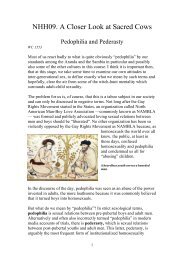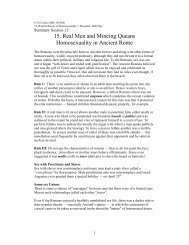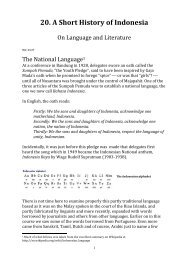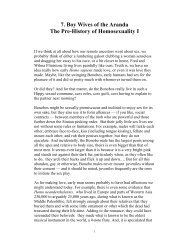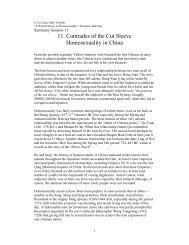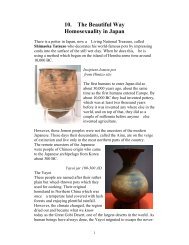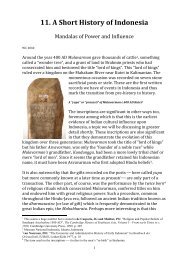15. Real Men and Mincing Queans Homosexuality in Ancient Rome
15. Real Men and Mincing Queans Homosexuality in Ancient Rome
15. Real Men and Mincing Queans Homosexuality in Ancient Rome
Create successful ePaper yourself
Turn your PDF publications into a flip-book with our unique Google optimized e-Paper software.
commented that homosexual acts were legal <strong>in</strong> <strong>Rome</strong> dur<strong>in</strong>g his lifetime,<br />
<strong>and</strong> it was not until the Emperor Philip attempted to make homosexual<br />
prostitution illegal <strong>in</strong> the 3 rd Century AD that there is any record of laws<br />
limit<strong>in</strong>g homosexual expression.<br />
Of course, if you are lucky enough to be able to read Roman poets <strong>in</strong><br />
Lat<strong>in</strong> you will know full well that expressions of romantic love between<br />
men or men <strong>and</strong> youths, albeit <strong>in</strong> the educated elite, were legion. Among<br />
others, Catullus, Virgil, Horace, Tibullus, Ovid, Martial <strong>and</strong> Juvenal, all<br />
wrote homoerotic poetry, even if — as <strong>in</strong> the obvious case of Juvenal —<br />
homosexuals were often satirized. Virgil’s Aeneid, his great epic about<br />
the foundation of <strong>Rome</strong>, <strong>in</strong>cludes the story of Nisus <strong>and</strong> Euryalus, Greek<br />
lovers who died heroes on the pla<strong>in</strong>s of Troy.<br />
Unfortunately, I can’t read Lat<strong>in</strong>, so I have to take Fone at his word when<br />
he says:<br />
Perhaps the greatest <strong>and</strong> most <strong>in</strong>fluential homoerotic poem<br />
of the ancient world, Virgil's Second Eclogue, tells the story<br />
of Corydon's unrequited love for Alexis. In his<br />
Metamorphoses, Ovid transforms the homoerotic Greek<br />
legends of Ganymede, Narcissus, Apollo <strong>and</strong> Cyparissus,<br />
<strong>and</strong> Apollo <strong>and</strong> Hyac<strong>in</strong>thus <strong>in</strong>to Lat<strong>in</strong> homoerotic romances.<br />
Catullus' love for Juventius — however cruel the response<br />
from that thoughtless, seductive youth — provides, if not the<br />
pleasure of view<strong>in</strong>g love triumphant, at least the pleasure of<br />
hear<strong>in</strong>g it described <strong>in</strong> the best Lat<strong>in</strong> verse.<br />
What I have read — several times, but <strong>in</strong> translation — is Gaius<br />
Petronius’ Satyricon. In this popular book, Encolpius recounts the<br />
sexual exploits of his young lover, Giton who seems to believe <strong>in</strong> the<br />
philosophy of “try anyth<strong>in</strong>g once”. In the Roman view, Encolpius is<br />
clearly mad to allow a passion to over-ride commonsense <strong>and</strong> to keep on<br />
tak<strong>in</strong>g Giton back. Giton, for his part, is demonstrably promiscuous <strong>and</strong><br />
this is a serious matter, of stuprum, if ever there was one. However, this<br />
is strangely enough a story about a couple who, despite outward<br />
appearances, really did love each other <strong>and</strong> <strong>in</strong> their way, exemplified<br />
undy<strong>in</strong>g love <strong>and</strong> devotion!<br />
4



